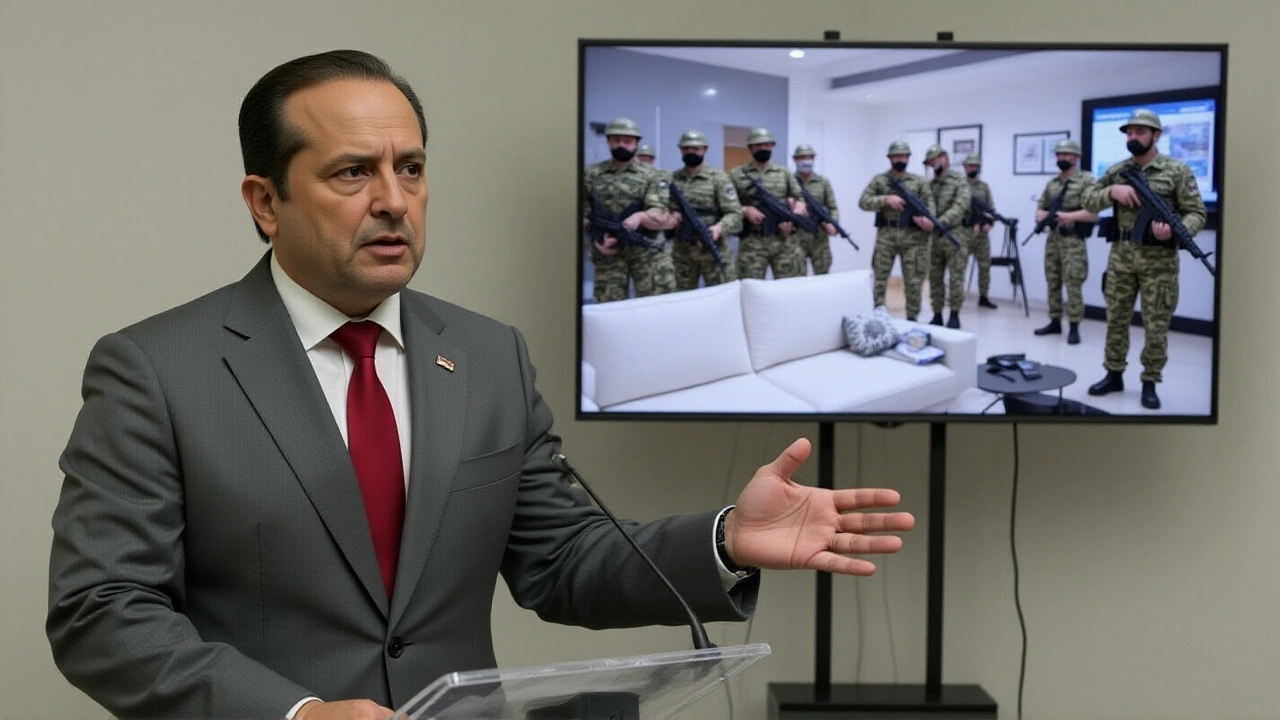 Nov, 21 2025
Nov, 21 2025
When Hernán Bermúdez Requena, the former security minister of Mexico’s Tabasco state, was dragged from a luxury home in Asunción on the night of September 14, 2025, it wasn’t just another arrest—it was the collapse of a decade-long escape. Nicknamed El Abuelo (The Grandfather) by his inner circle, Bermúdez, 62, had vanished from Mexico in January 2025 after authorities issued a warrant for his arrest. Now, with Paraguayan agents pinning him to the floor in footage later released to the public, he’s facing extradition on charges of heading the La Barredora cartel, extortion, kidnapping, and criminal association. The twist? He didn’t flee to a tropical island or a Swiss bank. He went straight to the heart of South America’s porous borders—and Paraguay’s president made sure he wouldn’t stay.
From Power Broker to Fugitive
Bermúdez didn’t slip away quietly. He served as police chief in Tabasco from 2018 to 2024 under governors Adán Augusto López Hernández and Carlos Manuel Merino Campos, both of the ruling Morena party. During those years, he oversaw a state police force that, according to Mexican federal prosecutors, became a front for organized crime. Over 47 criminal complaints were filed against him, detailing everything from protecting drug shipments along the Gulf Coast to extorting small businesses in Villahermosa. The investigation into La Barredora began in 2023, after López Hernández—now Mexico’s Secretary of the Interior—authorized a special prosecutor to dig into corruption within the state’s security apparatus. What they found was chilling: a network where police uniforms doubled as cartel IDs.By late 2024, internal leaks and wiretaps pointed directly at Bermúdez. He resigned abruptly in December 2024, claiming "family reasons." But by January 2025, an arrest warrant was issued. His flight began: first to Panama, then Spain, then Brazil. Each stop lasted weeks. Each move was deliberate. He wasn’t hiding—he was positioning.
The Paraguayan Trap
The break came not from a high-tech surveillance drone, but from a gambling arrest. In July 2025, Bermúdez’s nephew was detained in Asunción for running an illegal poker ring. During interrogation, the nephew, under pressure, mentioned his uncle’s presence. That single name triggered a months-long operation by Paraguay’s National Anti-Drugs Secretariat (SENAD), working in tandem with Mexico’s National Intelligence Center. Surveillance teams tracked license plates, monitored phone pings, and even followed grocery deliveries to a gated compound in the upscale neighborhood of Loma Pytâ.The raid on September 14 was surgical. Twenty-eight SENAD agents, backed by 12 Mexican federal police officers, surrounded the house at 9:45 p.m. local time. No shots fired. No resistance. Just silence—and the sound of handcuffs clicking shut. Authorities seized laptops, encrypted phones, and a safe containing cash, gold bars, and documents linking Bermúdez to money laundering operations in Paraguay and Colombia. "These aren’t just assets," said Paraguayan Attorney General Sergio Alegre. "They’re the ledger of a man who turned public office into a criminal franchise."

Why Paraguay? And Why Now?
Paraguay has long been a transit hub for drugs moving from Colombia and Bolivia to Brazil and Argentina. But until now, it hadn’t been known as a safe haven for high-profile Mexican fugitives. That changed with Bermúdez. Investigators believe he planned to establish a new cell of La Barredora in Paraguay, leveraging its weak border controls and existing criminal networks to expand into contraband tobacco, counterfeit pharmaceuticals, and human trafficking routes.President Santiago Peña didn’t waste time making a statement. "I recognize and value the commitment of the president of Mexico, @Claudiashein," he said publicly. "Paraguay won’t be a refuge for criminals and will remain resolute in the fight against organized crime." It was a rare, unambiguous declaration from a leader often criticized for lax enforcement. The message was clear: even if you’re a former government official, even if you think you’ve outmaneuvered the system, Paraguay’s doors are closed.
The Extradition Clock Is Ticking
Bermúdez refused a simplified extradition process during his hearing on September 15, 2025. That means the full legal procedure—requiring court reviews, appeals, and diplomatic coordination—will take 60 days. He’s now held in SENAD’s high-security detention facility in Asunción, with no visitors allowed. His legal team has hinted at filing habeas corpus petitions, but legal experts say those are procedural delays, not real defenses. The evidence is overwhelming: fingerprints on weapons recovered in Tabasco, encrypted messages linking him to cartel lieutenants still at large, and bank transfers traced to shell companies in Panama.He’s expected to be handed over to Mexican authorities in November 2025. But even if he returns, his story isn’t over. Mexican prosecutors are still building cases against 14 former Tabasco police officers linked to La Barredora. And Adán Augusto López Hernández, now a top federal official, is under mounting pressure to explain how such corruption flourished under his watch.

What This Means for Mexico’s Security Crisis
This arrest isn’t just about one man. It’s a mirror held up to Mexico’s deep rot in state security institutions. For years, governors like López Hernández and Merino Campos touted their "peace and security" agendas while their police forces were infiltrated from within. The La Barredora cartel didn’t rise in the shadows—it was built in plain sight, with official badges and state-issued vehicles.What’s different now? The international collaboration. For the first time, Paraguay didn’t look away. Mexico didn’t just ask—it delivered detailed evidence. And the world watched. The arrest sends a message to other fugitive officials: your passport won’t save you. Your title won’t protect you. And if you think you’ve escaped justice, you’ve only delayed it.
Frequently Asked Questions
How did Paraguayan authorities know Hernán Bermúdez Requena was in the country?
Authorities discovered his presence after his nephew was arrested in July 2025 for running an illegal gambling ring in Asunción. During questioning, the nephew revealed Bermúdez was living nearby under a false name. This triggered a joint investigation between Paraguay’s SENAD and Mexico’s National Intelligence Center, which tracked his movements through financial transactions, phone signals, and vehicle registrations over the following weeks.
What is La Barredora, and how was it connected to Tabasco’s government?
La Barredora was a criminal organization that operated under the guise of Tabasco’s state police force from 2018 to 2024. Investigators found that officers under Bermúdez’s command provided protection for drug shipments, collected extortion payments from businesses, and even helped move weapons across state lines. Over 47 criminal complaints were filed against him, including evidence that he authorized police patrols to avoid certain neighborhoods where cartel activity was concentrated—effectively giving cartels free rein.
Why did Bermúdez refuse simplified extradition?
Refusing simplified extradition is a common legal tactic to delay proceedings and buy time for appeals or political pressure. While it adds 60 days to the process, it doesn’t change the outcome—it only prolongs the legal drama. His legal team likely hopes to exploit bureaucratic delays, challenge evidence admissibility, or even seek asylum claims, though none have been formally filed yet.
What role did Mexico’s National Intelligence Center play in the arrest?
Mexico’s National Intelligence Center provided critical intelligence: encrypted communications, financial records linking Bermúdez to offshore accounts, and biometric data confirming his identity across multiple countries. They also shared surveillance footage from Tabasco showing him meeting with known cartel members. This evidence was vital for Paraguay’s Public Ministry to justify the arrest and extradition request under their bilateral treaty.
What happens to Bermúdez once he’s returned to Mexico?
He will face trial in a federal court in Mexico City on charges including organized crime leadership, extortion, and kidnapping. Prosecutors plan to use the seized assets—cash, gold, and documents—as evidence of illicit enrichment. If convicted, he could face up to 50 years in prison. He’s also likely to be named as a key witness in ongoing investigations into former Tabasco officials, potentially triggering a wave of arrests.
Could this arrest lead to more extraditions from Paraguay?
Absolutely. President Peña’s public statement signals a policy shift. Paraguay has historically been reluctant to extradite foreigners, especially those with political connections. But with Bermúdez’s arrest, the government has signaled it will prioritize international cooperation over political protection. Mexican authorities are already preparing extradition requests for at least three other fugitive officials linked to cartel activity, and Brazil and Argentina are expected to follow suit.
